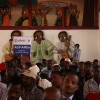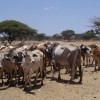- Home
- About USAID/Ethiopia
- Programs
- Feed the Future Initiative
- Agricultural Growth and Food Security
- Agricultural Growth Program – Agribusiness and Market Development
- Agricultural Growth Program – Livestock Market Development
- Empowering New Generations in Improved Nutrition and Economic opportunities
- EthioPEA Alliance
- Ethiopia Strengthening Land Administration Program
- Rapid Deployment of High-Yielding and Rust-Resistant Wheat Varieties
- Smallholder Horticulture Project
- Climate Change and Natural Resource Management
- Food Aid and Humanitarian Assistance
- Linking the Vulnerable to Markets
- Private Sector Development
- Agricultural Growth and Food Security
- Global Health Initiative
- President’s Emergency Program for AIDS Relief
- "Yekokeb Berhan" Program for Highly Vulnerable Children
- Communication for Change
- Community Prevention of Mother to Child Transmission
- Ethiopian Network for HIV and AIDS Treatment, Care and Support Program
- Grants Solicitation and Management
- HIV Prevention for Vulnerable Adolescent Girls
- Health Infrastructure Program
- MULU Prevention Program for Most At-Risk Populations
- MULU Workplace HIV Prevention Program
- Prevention and Care Services for At Risk Mobile Populations
- Preventive Care Package Program
- Private Health Sector Program
- Strengthening Pediatric Case Finding Utilizing Community and Facility Approaches
- Strengthening the Federal Level Response to Highly Vulnerable Ethiopian Children
- Urban HIV/AIDS Nutrition and Food Security Project
- Urban Health Extension Program
- President’s Malaria Initiative
- Communication for Change
- DELIVER II Malaria Rapid Diagnostic Tests and Laboratory Equipment
- Indoor Residual Spraying for Malaria Control
- Malaria Care: Universal Diagnosis and Treatment to Improve Maternal and Child Health
- Malaria Laboratory Diagnosis and Monitoring
- Malaria Operational Research
- Monitoring and Evaluation Activities for Malaria Prevention and Control in Ethiopia
- Promoting the Quality of Medicine
- Sustaining Malaria Reduction Interventions in Ethiopia
- Systems for Improved Access to Pharmaceuticals and Services
- Family Planning and Reproductive Health
- Health Systems Management
- Maternal, Newborn and Child Health
- Nutrition
- Tuberculosis
- Water and Sanitation
- Ethiopia Demographic and Health Survey 2011 - Final Report
- President’s Emergency Program for AIDS Relief
- Education
- Fre-Addis Girls’ Scholarships
- Improving Quality of Primary Education Program
- Improving the Teaching of English Language in Ethiopia
- Reading for Ethiopia’s Achievement Developed (READ)
- School-Community Partnership Serving Orphans and Vulnerable Children
- Strengthening Civic Education in Primary Schools
- Sustainable Water Resources: Capacity Building in Education, Research and Outreach
- Teacher Development in Primary Education Strengthened
- Transforming Education for Adults and Children in the Hinterlands
- Good Governance
- Cross-Cutting Issues
- Africa Union Regional Program
- Feed the Future Initiative
- Work With Us
- Procurement
- Employment
- Climate and Water Advisor for Economic Growth and Transformation Office, GS-11
- HIV/AIDS Deputy Team Leader FSN-12
- Peace Corps-Driver/Mechanic
- Peace Corps-Food Security Support & Technical Training Assistant
- Peace Corps-Regional Volunteer Support and Office Manager
- Project Management Specialist (Key Populations), FSN-11
- Powering Agriculture: An Energy Grand Challenge for Development
- Newsroom
- Links
- Contact
- Site Map
- Activity Map
















